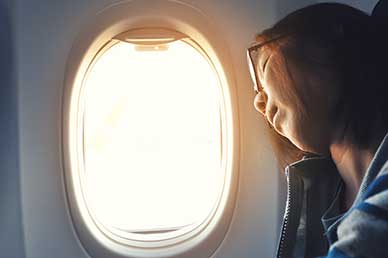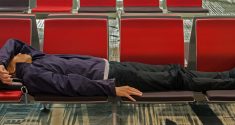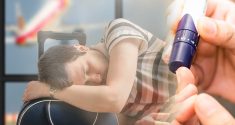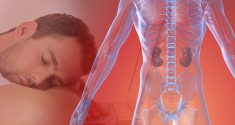New research into the function of a specialized group of retinal cells offers hope for innovative ways to treat jet lag and other circadian disorders.
Most of us have experienced jet lag in one form or another. You probably know the symptoms well: difficulty falling asleep, difficulty waking up and poor quality sleep when you actually can manage to get some shut-eye. While jet lag and other circadian disorders are very common, there remains no definitive treatment. However, new research suggests that a simple eye drop may someday be the answer.
The Effects of Jet Lag
Whether you have to travel for business, pleasure or simply work hours outside of the norm, there is no escaping occasional jet lag in modern life. Even daylight saving time produces jet lag in a large portion of the population. While the effects of jet lag are mainly temporary, there can be long-term consequences as well. Over time, sleepless nights and groggy mornings can add up to a higher risk of serious diseases such as hypertension and diabetes.
Because the circadian rhythm is extremely complex, researchers and scientists have yet to find a definitive way to treat dysregulation of our internal clocks as modern treatments may not work for everyone. Most people simply wait for their bodies to adjust with the aid of melatonin and other supplements to hasten the process. This adjustment can take days or even weeks. Could there be a better answer?
Could Specialized Eye Drops Treat Jet Lag?
 Scientists have known for quite some time that light sensed by the retinas is the beginning of an important biochemical cascade that leads to the suprachiasmatic nucleus (or SCN) of the hypothalamus, where our internal clocks are synced. Recent research into these retinal cells suggests that a hormone known as vasopressin appears to be important in this process. While many cells in the retina sense light, one small population communicates directly with the SCN and releases vasopressin in response to light cues. In turn, vasopressin enhances the reaction of the SCN to other light cues and increases the expression of genes that regulate the circadian rhythm.
Scientists have known for quite some time that light sensed by the retinas is the beginning of an important biochemical cascade that leads to the suprachiasmatic nucleus (or SCN) of the hypothalamus, where our internal clocks are synced. Recent research into these retinal cells suggests that a hormone known as vasopressin appears to be important in this process. While many cells in the retina sense light, one small population communicates directly with the SCN and releases vasopressin in response to light cues. In turn, vasopressin enhances the reaction of the SCN to other light cues and increases the expression of genes that regulate the circadian rhythm.
This research is particularly exciting because vasopressin is already used as a medication to treat other medical disorders. It may be possible to produce an eye drop containing vasopressin that can treat jet lag.
What is Vasopressin?
How is vasopressin used to regulate the circadian rhythm? Vasopressin is a hormone produced by the hypothalamus and stored and secreted by the posterior pituitary gland. Vasopressin is important in fluid and electrolyte balance, but recent studies are showing that it plays a variety of roles in the human body. This hormone causes our bodies to retain water, thereby raising blood pressure. It also causes certain types of muscle to contract, including the uterus and small blood vessels. It has never been implicated in circadian rhythm control before, making this research surprising. However, the study results are clear: Rats with retinas that caused the release of less vasopressin suffered more jet lag and more circadian dysregulation than those with functioning vasopressin-expressing retinal ganglion cells.
Implications for Human Health
This study in chronobiology offers hope for sufferers of jet lag and other disorders of the circadian rhythm. Vasopressin eye drops may be able to communicate the same messages to the SCN as this group of retinal cells and thus treat jet lag quickly and effectively.
“Our exciting results show a potentially new pharmacological route to manipulate our internal biological clocks,”
explains Mike Ludwig, study author and professor of neurophysiology at the University of Edinburgh,
“Studies in the future, which alter vasopressin signaling through the eye, could lead to developing eye drops to get rid of jet lag, but we are still a long way off from this.”
Although there will need to be further study before we can treat jet lag, this approach offers promise.
Many people all over the world long for a good night of sleep. Thanks to this study, they may soon find their wishes fulfilled. Vasopressin offers hope that jet lag may soon be treated with a simple and effective eye drop.







